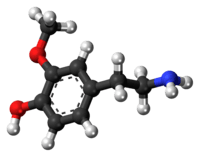3-Methoxytyramine
 | |
 | |
| Names | |
|---|---|
| IUPAC name
4-(2-aminoethyl)-2-methoxyphenol | |
| Other names
3-O-methyldopamine | |
| Identifiers | |
| 554-52-9 | |
| 3D model (Jmol) | Interactive image |
| ChemSpider | 1606 |
| ECHA InfoCard | 100.122.789 |
| 6642 | |
| MeSH | 3-methoxytyramine |
| PubChem | 1669 |
| |
| |
| Properties | |
| C9H13NO2 | |
| Molar mass | 167.21 g/mol |
| Except where otherwise noted, data are given for materials in their standard state (at 25 °C [77 °F], 100 kPa). | |
| | |
| Infobox references | |
3-Methoxytyramine (3-MT), also known as 3-methoxy-4-hydroxyphenethylamine, is a metabolite of the neurotransmitter dopamine formed by the introduction of a methyl group to dopamine by the enzyme catechol-O-methyl transferase (COMT). 3-MT can be further metabolized by the enzyme monoamine oxidase (MAO) to form homovanillic acid (HVA), which is then typically excreted in the urine.
Originally thought to be physiologically inactive, 3-MT has recently been shown to act as an agonist of human TAAR1.[1]
Occurrence
3-Methoxytyramine occurs naturally in the prickly pear cactus (genus Opuntia),[2] and is in general widespread throughout the Cactaceae.[3] It has also been found in crown gall tumors on Nicotiana sp.[4]
See also
References
- ↑ Sotnikova TD, Beaulieu JM, Espinoza S, et al. (2010). "The dopamine metabolite 3-methoxytyramine is a neuromodulator". PLOS ONE. 5 (10): e13452. doi:10.1371/journal.pone.0013452. PMC 2956650
 . PMID 20976142.
. PMID 20976142. - ↑ Neuwinger, Hans Dieter (1996). "Cactaceae". African ethnobotany: poisons and drugs: chemistry, pharmacology, toxicology. CRC Press. p. 271. ISBN 978-3-8261-0077-2. Retrieved on June 12, 2009 through Google Book Search.
- ↑ Smith T. A. (1977). "Phenethylamine and related compounds in plants". Phytochem. 16: 9–18. doi:10.1016/0031-9422(77)83004-5.
- ↑ Mitchell S. D.; Firmin J. L.; Gray D. O. (1984). "Enhanced 3-methoxytyramine levels in crown gall tumours and other undifferentiated plant tissues". Biochem J. 221: 891–5. doi:10.1042/bj2210891.
This article is issued from Wikipedia - version of the 10/27/2016. The text is available under the Creative Commons Attribution/Share Alike but additional terms may apply for the media files.